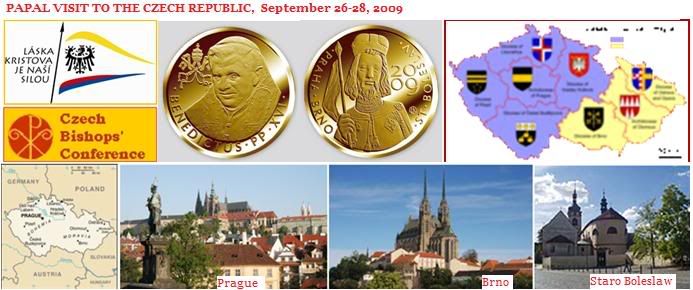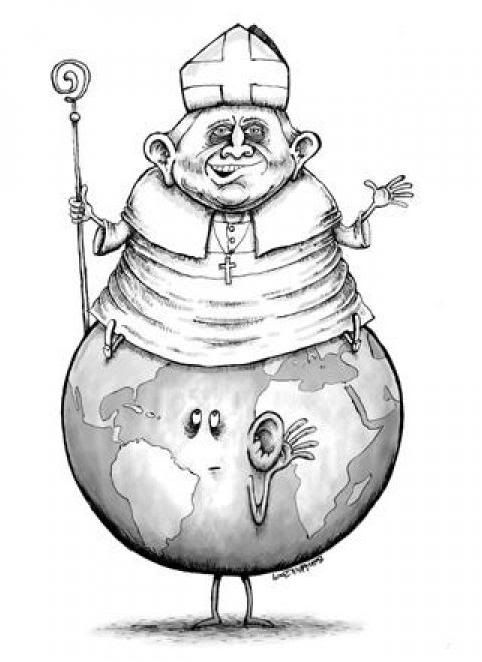 Here's the article John Allen alerted us that a Czech newspaper asked him to write for the visit. The accompanying cartoon is rather literal and crude, but the article is excellent, especially for the secular audience it is addressed to. Posted earlier in the BENEDICT thread.
The Pope still matters
Here's the article John Allen alerted us that a Czech newspaper asked him to write for the visit. The accompanying cartoon is rather literal and crude, but the article is excellent, especially for the secular audience it is addressed to. Posted earlier in the BENEDICT thread.
The Pope still matters
Even in the increasingly secular West,
the Pontiff remains a key political and social force'
By John L. Allen Jr.

Sept. 23, 2009

Soviet Prime Minister Joseph Stalin, informed of an anti-communist declaration by Pope Pius XII during the 1940s, is said to have contemptuously asked, "How many divisions does the Pope have?"
Pius, a career diplomat and no stranger to Realpolitik, nevertheless offered a decidedly spiritual reply: "He will meet my divisions in the next world."
Forty years later, another Pope, John Paul II, wasn't quite so patient about picking up the gauntlet Stalin had flung down. By aggressively supporting the Solidarity movement, the Polish Pope helped send the dominoes tumbling that eventually led to the fall of the Berlin Wall and the collapse of communism.
Today, Stalin is remembered as one of the arch-villains of the 20th century, while John Paul the Great is conventionally lifted up alongside Nelson Mandela and Gandhi as one of the century's iconic heroes.
All this offers a reminder that, while the Pope's divisions may belong to the next world, the social and political influence of the papacy is very much part of this one.
Forget about theology for a moment. In purely empirical, sociological terms, the Catholic Church is to religion what the United States is to geopolitics: the lone superpower, or at least the lone "indispensable nation," without whose involvement resolution of virtually any global crisis is difficult to imagine.
Worldwide there are 1.2 billion Roman Catholics, scattered in every nook and cranny of the planet. While Catholicism may be struggling in the West, it's exploding elsewhere. The Catholic population of sub-Saharan Africa went from 1.9 million in 1900 to 130 million in 2000, a growth rate of almost 7,000 percent.
Moreover, Catholicism is the world's most vertically integrated religious organization, with clear lines of authority radiating out from Rome down to local parishes in Africa, Latin America and points beyond. (As a thought exercise, try asking yourself sometime who's in charge of Islam, or Christian Pentecostalism, and you'll begin to see what makes Catholicism unique.)
Catholicism is also the only religious body to have its own diplomatic corps. The Holy See, the formal name of the Vatican as a sovereign state, has diplomatic relations with 177 nations (including the Czech Republic) and enjoys observer status with every major international organization, including the United Nations.
No global leader makes a trip to Italy without calling on the Pope, and usually that meeting draws far greater interest than a similar session with the Italian prime minister.
The papacy is the biggest bully pulpit on the religious stage. Analyses of global media outlets routinely show that the Pope (any Pope) is the most-covered, most-quoted religious leader in the world, easily outpacing his nearest rival, the Dalai Lama.
The unique blend of mystery, ritual and theater in Catholicism still captivates the public imagination. Can one really imagine Dan Brown selling millions of copies of a potboiler novel about the Lutheran World Federation?
To be sure, the papacy in the 21st century is not what it once was. Centuries of secularization have weakened its hold on the West, particularly in Europe, where, in some places, the Catholic Church seems a shell of its former self.
The numbers of priests and nuns have plummeted, less than 20 percent of European Catholics bother to attend Sunday Mass, and the Church's political weight is so attenuated that it couldn't persuade the European Union to include so much as a generic reference to God in its draft constitutional document.
Even in ultra-Catholic Italy, abortion and divorce are both legal, condoms are for sale just a few feet from the Vatican walls, and scantily clad women cavort every night on prime-time television.
Inside the Church, too, the Pope's authority is hardly absolute. These days, issuance of a Vatican ruling is tantamount to blowing a starter's whistle to see which bloc of dissident theologians and in-house critics can win the sprint to denounce it.
Opinion polls routinely show that majorities of self-declared Catholics in the West disagree with the Pope on all manner of issues, from birth control to female priests.
That said, Popes who know how to spend whatever social capital they have left can still change history.
John Paul II's role in ending communism is the best known example, but one could cite any number of other cases. In the mid-1990s, the Vatican and Islamic countries prevented a UN conference on population in Cairo from recognizing a right to abortion in international law. (Critics dubbed their intervention an "unholy alliance.")
In 2003, John Paul's staunch moral opposition to the U.S.-led war in Iraq helped the Muslim street to distinguish between the foreign policy of the Bush administration and broader Western sentiment, thereby dampening anti-Christian backlash in the world's 56 majority Muslim states.
More recently, Pope Benedict XVI set off a firestorm in the Islamic world with a Sept. 12, 2006, lecture in Regensburg, Germany, in which he linked Muhammad with violence.
Since then, however, carving out an "alliance of civilizations" with Islam has become Benedict's top inter-faith priority, and there's considerable evidence that it's working.
When Benedict traveled to the Middle East in May, Islamic leaders such as Jordan's King Abdullah and the Grand Mufti of Jerusalem, Muhammad Ahmad Hussein, welcomed him with open arms, vowing to stand together against secularization.
However emancipated European societies may claim to be, they too pay close attention to the Pope. When Benedict XVI recently declared on a trip to Africa that condoms make the AIDS crisis worse, he was formally denounced by the Belgian Parliament, and Spain's Socialist regime shipped 1 million condoms to Africa in protest.
What's striking is that other religious leaders say this sort of thing all the time; it took the Pope to make secular elites react.
Even when the Pope stumbles, heads turn. [
'Even when'? Especially when!] When Benedict XVI lifted the excommunications of four traditionalist Catholic bishops last January, including one who is a Holocaust denier, without adequately explaining the logic for doing so, it set off a crisis in Jewish/Christian relations and triggered a global media frenzy.
In short, for good or ill, the Pope still matters.
To Catholics, of course, the Pope is the Vicar of Christ, so, even if he couldn't influence a single vote or draw the interest of a single journalist, he would still be a central presence in their faith.
Yet the most ardently convinced atheist ought to realize that religion remains an enormously important motivating force in human affairs, and that the Pope is the most important religious leader on the planet.
While it may take faith to recognize the Pope's spiritual authority, all it requires to grasp his relevance, even in the early 21st century, is opening one's eyes.
The author is the senior correspondent for the National Catholic Reporter in the United States and the Vatican analyst for CNN and National Public Radio. He is the author of The Rise of Benedict XVI (Doubleday, 2005) and will be in the Czech Republic covering the visit of Pope Benedict XVI.